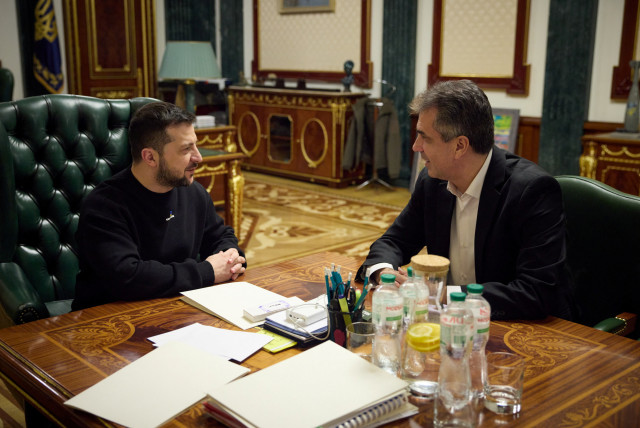Ukraine calls for Israeli anti-missile system after 23 killed in Uman

Yermak referenced the tradition which sees tens of thousands of Israelis travel to Uman each year to pray at the gravesite of Rebbe Nachman of Breslov.
Kyiv renewed its call on Israel to send Ukraine an anti-missile defense system after the deadly Russian strike on Friday in Uman, where the revered early 19th-century Hassidic Rebbe Nahman of Breslov is buried.
“Israel should use this moment to step up anti-missile and anti-drone support to Ukraine and help protect civilians from Russia’s war of aggression,” said Andriy Yermak, who heads the office of Ukrainian President Volodymyr Zelensky.
He spoke in a message that he sent Friday night directly to The Jerusalem Post.
Israel has to date rebuffed Ukrainian requests for protective anti-missile and anti-drone systems, fearing it would exacerbate the already tense situation with Moscow. As of last October, it has promised to send an early alert system that would improve the accuracy by which incoming missiles are detected.
“The latest chapter in Russia’s war crimes epidemic has seen missiles rain down indiscriminately on civilians as they slept in the holy city of Uman,” Yermak said, as he referred to the special relationship that Israel and the Jewish people have with Uman.
Tens of thousands of Israelis along with Diaspora Jews travel to Uman each year, particularly on Rosh Hashanah to pray at the grave site of Rebbe Nachman who died in 1810.
Last year some 7,000 to 10,000 Israelis ignored official warnings against such a trip due to the war and flew out to Uman to take part in the annual pilgrimage.
Yermak said that “All Israelis – those who visit Uman and those who never have but know what missiles raining down on civilians feels like, should take note” of the carnage that occurred there on Friday.
He accused Moscow of seeking to annihilate the Ukrainian people.
“There is a new genocide in Europe and it is being executed by the Kremlin,” he said.
“We need more support from Israel,” Yermak added.
Israel’s Ambassador to Ukraine Michael Brodsky issued a solidarity tweet explaining that Uman “holds special religious and cultural meaning for Jews around the world.
“We share the pain of the loss of innocent lives and stand with the people of Ukraine at this tough hour, after the Russian missile attack that resulted in the death of civilians.”
Largest Russian assault in months
Russia hurled missiles at cities across Ukraine as people slept overnight on Thursday and early on Friday morning, killing at least 25 civilians in the first large-scale air strikes in nearly two months, as Kyiv said it was nearly ready to launch a huge assault to retake occupied land.
Firefighters tackled a blaze at a residential apartment hit by a Russian missile in the central town of Uman and rescue workers clambered through a huge pile of smoldering rubble, searching for survivors and bodies as anxious people stood by.
Officials said at least 23 civilians were killed, including four children, with an estimated 109 people living in the part of the block that was hit and 27 flats completely destroyed.
How has Israel helped Ukraine previously?
In February, Israel's Foreign Minister Eli Cohen met with Ukrainian President Volodymyr Zelensky. Cohen publicly agreed to back Zelensky’s peace plan when it comes for a vote at the United Nations General Assembly next week.
“Israel supports the independence and sovereignty of Ukraine and we will support the proposed Ukrainian resolution at the UN,” he said.
Israel also agreed to make good on the previous government’s promise to provide Ukraine with an early warning alert system, something that former Defense Minister Benny Gantz had already told Ukraine would happen last October.
The visit was the most proactive public gesture Israel has made in the last year, coming just six weeks after Prime Minister Benjamin Netanyahu’s new government was sworn in.
Zelensky issued a positive statement about Cohen’s visit as the foreign minister headed out of the city. “Israel has always been our important partner in the Middle East. This is the first visit of an Israeli representative since the beginning of the full-scale invasion,” the president said.
“We discussed deepening bilateral cooperation in various areas. I invite Israel to join the implementation of our Peace Formula; I am grateful for the humanitarian aid provided. We discussed the country’s participation in post-war reconstruction. Ukraine could use Israel’s experience,” Zelensky said.
“I hope that this visit will contribute to deepening our cooperation.”
Israel is under pressure from the US to do more to help Ukraine on the economic, humanitarian and security levels, but Cohen’s trip came out of his own deep conviction that the Jewish state has to do more to help the beleaguered country.
Israel is in a complex situation when it comes to Ukraine, given the military presence of Russia in neighboring Syria and the importance of maintaining ties with Moscow to coordinate actions against Iran in the region.
It is hopeful that Kyiv understands the complexity of the situation Israel finds itself in and the reasons that it is hesitant to cross what has been a clear line for Moscow, about not providing Ukraine with defensive weapons.
Reuters contributed to this report.
Jerusalem Post Store
`; document.getElementById("linkPremium").innerHTML = cont; var divWithLink = document.getElementById("premium-link"); if (divWithLink !== null && divWithLink !== 'undefined') { divWithLink.style.border = "solid 1px #cb0f3e"; divWithLink.style.textAlign = "center"; divWithLink.style.marginBottom = "15px"; divWithLink.style.marginTop = "15px"; divWithLink.style.width = "100%"; divWithLink.style.backgroundColor = "#122952"; divWithLink.style.color = "#ffffff"; divWithLink.style.lineHeight = "1.5"; } } (function (v, i) { });


